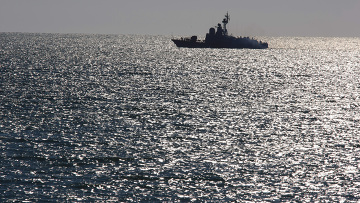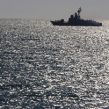
Naval Security Deficit Growing in the Black Sea
Publication: Eurasia Daily Monitor Volume: 6 Issue: 170
By:

On September 15 Russia officially warned that it would intercept and detain Georgian coastal guard boats in the Black Sea, if these attempt to interfere with ships that trade with Abkhazia, or if the Georgian boats otherwise trespass Abkhazia’s "maritime border" into "Abkhaz waters." The warning accompanies the deployment of Russian coastal guard units to Abkhazia (EDM, September 16).
Under international law, however, trading with the unrecognized Abkhazia is illegal and there is no such thing as Abkhaz borders or territorial waters. Russia’s warning and the construction of its coastal guard base in Abkhazia amount to changing the maritime border de facto through the use of force (since August 2008) and enforcing that change by threats of using force again.
This move is a maritime equivalent of Moscow’s methods on land in the South Caucasus: shifting land borders de facto through military action, implanting Russian military bases there, arming local proxies to help enforce this dispensation, and co-sponsoring smuggling and trafficking as part of the "controlled instability" paradigm. Those processes characterized the "frozen conflicts" from the 1990’s to date, which rendered international law inapplicable in large parts of the South Caucasus.
Moscow is now extending those methods from the South Caucasus land mass, westward into the Black Sea. This move creates the potential for maritime incidents and unlawful trafficking in the Black Sea. By occupying Abkhazia under the excuse of "recognizing" it, Russia has gained 215 kilometers of Black Sea coastline. The lawless (in terms of international law) environment of the frozen-conflict areas may well spread into the Black Sea, unless this process is checked through timely international actions.
Georgia has declared the Abkhaz port of Sukhumi closed to all ships. Sailing there is unlawful, except in individual cases with Georgian consent. Under international law, Georgia reserves the right to impound the offending ship and its cargo and to put them up for auction.
In recent months, Georgia’s modest coastal guard (decimated during the 2008 war while at anchor) intercepted several ships that were engaged in the unlawful trade with Abkhazia. Most of these ships originated in Turkey. In the latest incident, the Georgians detained a Turkish ship and crew in mid-August and impounded its cargo of petroleum products bound for Abkhazia. The incident was resolved with Turkey in early September through diplomatic channels, Russia, however, turned the incident into an opportunity to demonstrate its power to overrule international law in a large part of the Black Sea.
Moscow and the Abkhaz authorities characterize such Georgian actions as "piracy." On September 2, Abkhaz "president" Sergei Bagapsh ordered Abkhaz gunboats to attack and destroy Georgian coastal guard boats if these attempt to stop third-party ships (most likely to be Turkish). Bagapsh said, "These actions will be exclusively Abkhaz actions. No Russian forces are needed for this and they will not be asked to do this" (Interfax, September 2).
Less than two weeks later, Russia threatened to intervene in such incidents, albeit not to destroy, but to detain Georgian coastal guard vessels. Bagapsh’s warning, however, raises the possibility that the Abkhaz could shoot while Russia disclaims responsibility for its controlled proxy’s actions. Such incidents have been standard procedure in the frozen conflicts on land, and the pattern is potentially repeatable at sea.
The Abkhaz have a few armed coastal boats of their own, sufficient to challenge Georgia’s modest coastal guard. This possibility, along with the Russian coastal guard’s deployment, can deter Georgian attempts to curb the illegal maritime trade. The Abkhaz "black hole" for smuggling and trafficking, long a problem on land where Russian troops were present, could now affect a large portion of the Black Sea under the Russian coastal guard’s watch.
With Russia and the Abkhaz deeming Georgia’s lawful actions as "piracy," Moscow can potentially use the relevant item in President Dmitry Medvedev’s latest doctrine on military intervention abroad. On September 9, the Russian Duma approved in the first reading Medvedev’ proposals to amend Russia’s Law on Defense. The amendments authorize Russia’s president unilaterally to order quick military action beyond Russia’s borders in a variety of situations. These include "fighting piracy and ensuring the safety of maritime shipping" (Interfax, September 9).
Russian naval action in the Georgia-Abkhazia theater would, in fact, qualify as ensuring the safety of smuggling, if third-party shipping bound for Abkhazia is involved. On September 15 in Tbilisi, the ministry of foreign affairs invited the resident ambassadors to express its concerns in this regard.




